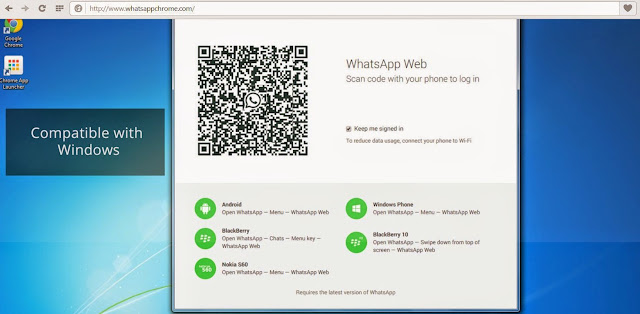Cybercriminals are known to take advantage of everything that captures public attention in order to spread malware, and the recently launched web client of the most popular WhatsApp messaging application seems to be their next target.
Last month, the messaging giant WhatsApp, with 700 million users worldwide, finally launched its web client to the public. The feature is called "WhatsApp Web," which gives its users the ability to read and send messages directly from their web browsers.
FAKE WHATSAPP WEB SPREADING BANKING TROJANS
However, malicious hackers have taken the advantage of the latest WhatsApp Web and have started fooling users all over the world with fake downloads masquerading as a desktop variant of the WhatsApp mobile application.
Security researchers at Kaspersky Labs have spotted a seemingly genuine WhatsApp Web for Windows in spam campaign available for fake download that actually spreads financial malware Trojans to the systems worldwide.
 |
| Beware of Fake 'WhatsApp Web' Spreading Banking Trojan |
"Fake downloads appeared in several languages and countries, and now there is a real product out there the fraudsters have returned to their old attacks, dressed them up in new clothes and sent them on the prowl for new victims," wrote Fabio Assolini from Kaspersky Lab.
APP MASQUERADE EXACTLY AS LEGITIMATE
Researchers found a number of malicious domains registered by the cybercriminals to host their malware. Some of them were already in use and others were waiting for command from the criminals. One such domain,whatsappcdesktop.com.br, was found to be distributing Brazilian banking Trojan.
Assolini also explained that the firm has discovered some cases where unsuspecting users have been fooled to install a suspicious Google Chrome extension shown as a simple messaging app, but in real has nothing to do with WhatsApp:
HACKERS GOAL - VICTIMS’ MOBILE NUMBERS
The researchers also spotted many other promising but unofficial desktop versions of the fake Whatsapp Web offered to Arabic and Spanish language speakers as the legitimate version of the popular messaging application.
The main objective is to get the mobile phone number of the victims. In some cases, the attackers requested victims to enter and submit their mobile number in an attempt to download the fake Whatsapp Web client.
Once submitted, the attacker would be able to run spam campaigns or make the victims unknowingly subscribe to premium-rate services.
BE CAREFUL AND FOLLOW RECOMMENDATION
A single unwanted message could lead you to harmful pages hosting malware that can infect your phones and carry out malicious things even without your knowledge.
It is almost impossible to get rid of unwanted messages, however it is safer to access WhatsApp on the web from the official website located at https://web.whatsapp.com. So, users are recommended to refuse imitations and suspicious applications.
Late last month, a 17-year-old security researcher discovered a couple of security holes in the WhatsApp Web client that may expose profile pictures of WhatsApp Web users. However, that was no surprise as these types of small security and implementation flaws could be expected at this time, but one thing is guaranteed that the app will not lead you to any Malware.



Would love to here from you...